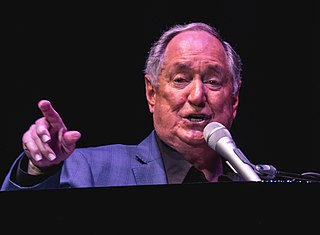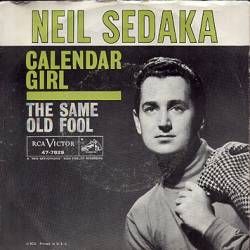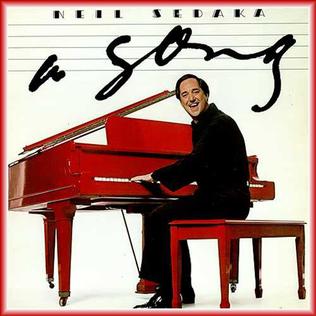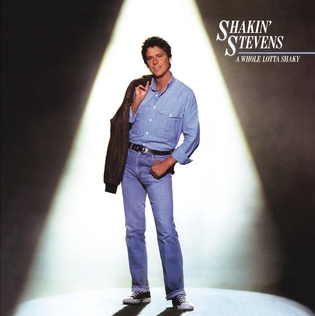
Neil Sedaka is an American singer-songwriter and pianist. Since his music career began in 1957, he has sold millions of records worldwide and has written or co-written over 500 songs for himself and other artists, collaborating mostly with lyricists Howard "Howie" Greenfield and Phil Cody.
Fool's errand is an English idiom referring to a foolish undertaking or a task certain to fail. It may also refer to:

Howard Greenfield was an American lyricist and songwriter, who for several years in the 1960s worked out of the famous Brill Building. He is best known for his successful songwriting collaborations, including one with Neil Sedaka from the late 1950s to the mid-1970s, and near-simultaneous songwriting partnerships with Jack Keller and Helen Miller throughout most of the 1960s.

"Love Will Keep Us Together" is a song written by Neil Sedaka and Howard Greenfield. It was first recorded by Sedaka in 1973. The brother-sister duo Mac and Katie Kissoon recorded their version of the song in 1973. American pop duo Captain & Tennille covered the song in 1975, with instrumental backing almost entirely by “Captain” Daryl Dragon, with the exception of drums played by Hal Blaine; their version became a worldwide hit.

Solitaire is a 1972 album by American singer-songwriter Neil Sedaka.
"What Do You Want to Make Those Eyes at Me For?" is a song written by Joseph McCarthy, Howard Johnson and James V. Monaco in 1916 for the Broadway production Follow Me, in which it was performed by Henry Lewis.
The History of Rock and Roll is a radio documentary on rock and roll music, originally syndicated in 1969, and again in 1978 and 1981. It is currently distributed as both a 2+1⁄2-minute short feature on internet networks, and a two-hour weekly series hosted by Wink Martindale, distributed to radio stations nationwide. This list below reflects the contents of the more widely heard 1978 version of The History of Rock & Roll.

The Epic Masters is a box set compilation comprising ten remastered albums by Shakin' Stevens. Released on 16 November 2009, the set contains nine albums originally released by Epic Records between 1980 and 1990, plus an exclusive CD of 12" extended mixes. The set was also made available as a download through iTunes.

"Calendar Girl" is a song by Neil Sedaka. The music was composed by Sedaka and the lyrics by Howard Greenfield. Recorded in 1959 and released in December 1960 as a single, it was a Top-5 hit single for Sedaka, peaking at No. 4 on the US charts, No. 3 in Australia, and No. 1 on the Canadian and Japanese charts.
Rock with Neil Sedaka or just Neil Sedaka is the first major solo album of Neil Sedaka released in 1959 after two 1958 albums under the titles Neil Sedaka and The Tokens and Neil Sedaka and The Tokens and Coins. The album was released by RCA Victor and was produced by Al Nevins. The album contains 12 songs, all of them co-written by Sedaka and his friend Howard Greenfield. Two of the songs became successful singles for Sedaka from the album, namely "The Diary", his debut single that was a hit, reaching No. 14 on the US Billboard charts, and "I Go Ape", a single that was relatively successful in the United States reaching No. 42, but did far better in the UK Singles Chart, making it up to No. 9 and his debut single in the United Kingdom.

Circulate is the second solo album of Neil Sedaka after his 1959 debut solo album Rock with Sedaka. Circulate was released in 1961 by RCA Victor and was produced by Al Nevins and Don Kirshner. Except for the title song "Circulate" and "I Found My World In You", the whole album contains covers of the 1930s, 1940s and 1950s songs as interpreted by Sedaka. Two of the songs were re-issued as B-sides of other hits: "I Found My World In You" was the B-side of "Sweet Little You" later in 1961, and "Circulate" was the B-side of "Alice In Wonderland" in 1963. Sedaka later recorded Italian-language versions of "Smile" and "All the Way"

Neil Sedaka Sings Little Devil and His Other Hits is a solo album by Neil Sedaka released in 1961 immediately after the cover versions of earlier hits in Circulate.

Oh! Carol: The Complete Recordings, 1955–66 is an eight CD box set of songs by Neil Sedaka. It was released in 2003 on Bear Family Records. The compilation is an almost exhaustive set of Sedaka's songs for the 1955 to 1966 period, encompassing 112 tunes. Most notably it includes his hits in English, as well as translations of his songs in German, Spanish, Italian, Japanese and Hebrew.
The following is a comprehensive discography of Neil Sedaka, the American singer.

A Song is an in-studio album containing the works of American pop star Neil Sedaka. It was produced by George Martin and released in 1977 on the Elektra label in the US, marking the beginning of Sedaka's association with Elektra, which would run through 1981. Outside of the US, A Song was released on the Polydor label. After several record labels released bootleg CD's sourced from vinyl pressings over the years, the album was officially remastered and released on CD and digital platforms on November 11th, 2022.
Lesley Gore: It's My Party is a five disc box set from Bear Family Records released June 21, 1994, that includes every Mercury Records release by Gore between 1963 and 1969. It also includes foreign language versions and never-released songs.

A Whole Lotta Shaky is an album by Welsh rock and roll singer Shakin' Stevens, released in November 1988 by Epic Records. It peaked at number 42 on the UK Albums Chart.

The Golden Hits of Jerry Lee Lewis is the third studio album by musician Jerry Lee Lewis that was released on Smash Records in 1964. It was Lewis's first album with the label after leaving Sun Records.
What Am I Gonna Do may refer to
"Because of Love" is a song by Elvis Presley, released on his soundtrack album Girls! Girls! Girls! in November 1962.












